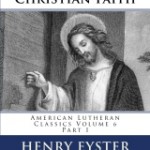As a follow up to my previous posts, here is the Formula of Concord’s teaching on sanctification:
“These words say absolutely nothing about our will, nor do they say that it effects something, even in the newborn human being, of itself, but they ascribe that to the Holy Spirit, which cleanses human beings and daily makes them more upright and holier.” SD II.35
“Through the ministry of preaching he brings us into the Christian community, in which he sanctifies us and brings about in us a daily increase of good works.” SD II.38
“Although those born anew come even in this life to the point that they desire the good and delight in it and even do good deeds and grow in practicing them, this is not (as was mentioned above) a product of our own will or power, but the Holy Spirit.” SD II.39
“As soon as the Holy Spirit has begun his work of rebirth and renewal in us through the Word and the holy sacraments, it is certain that on the basis of his power we can and should be cooperating with him, though still in great weakness.” SD II.65
“Because in this life we receive only the first fruits of the Spirit and our rebirth is not complete but rather only begun in us, the struggle and battle of the flesh against the Spirit continues even in the elect and truly reborn.” SD II.68
“these same gifts [renewal and conversion as explained earlier in the paragraph] are retained, strengthened, and increased.” SD II.72
“Likewise, too, although renewal and sanctification are a blessing of our mediator Christ and a work of the Holy Spirit, they do not belong to the article or in the treatment of justification before God but rather result from it since, because of our corrupted flesh, they are never fully pure and perfect in this life.” SD III.28
“This does not mean on the other hand, that we may or should pursue sinning or remain and continue in sin without repentance, conversion, and improvement.” SD III.22
“He renews them and sanctifies them, and he creates in them love toward God and the neighbor.” SD III.23
“It is correct to say that in this life believers who have become righteous through faith in Christ have first of all the righteousness of faith that is reckoned to them and then thereafter the righteousness of new obedience or good works that are begun in them. But these two kinds of righteousness dare not be mixed with each other or simultaneously introduced into the article on justification by faith before God. For because this righteousness that is begun in us–this renewal–is imperfect and impure in this life because of our flesh, a person cannot use it in any way to stand before God’s judgment throne… Even following their renewal, when they already are producing many good works and living the best kind of life, human beings please God, are acceptable to him, and receive adoption as children and heirs of eternal life only because of Christ’s obedience.” SD III.32
“Therefore, even if the converted and believers have the beginnings of renewal, sanctification, love, virtues, and good works, yet these cannot, should not, and must not be introduced or mixed with the article of justification before God.” SD III.35
“Thereafter, once people are justified, the Holy Spirit also renews and sanctifies them. From this renewal and sanctification the fruit of good works follow.” SD III.41
“Many construct for themselves a dead faith or illusory faith, which exists without repentance or good works. As if true faith and the evil intention to remain and continue in sin could exist in a single heart at the same time! That is impossible.” SD IV. 15











